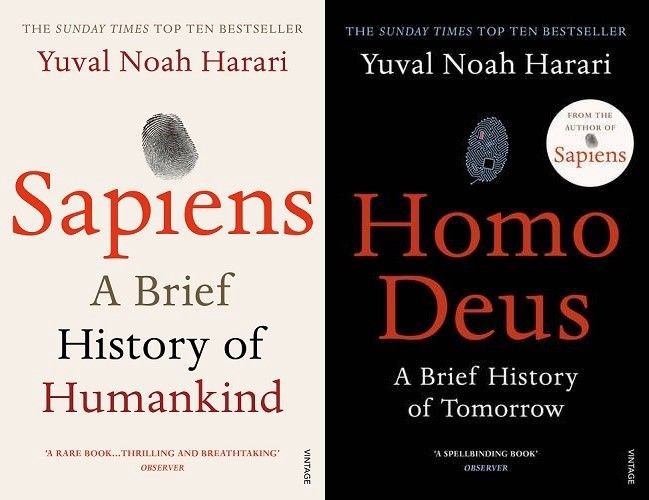


In discussing the unification of humankind, Harari argues that over its history, the trend for Sapiens has increasingly been towards political and economic interdependence.

Humans' violent treatment of other animals is a theme that runs throughout the book. Harari's key claim regarding the Agricultural Revolution is that while it promoted population growth for Sapiens and co-evolving species like wheat and cows, it made the lives of most individuals (and animals) worse than they had been when Sapiens were mostly hunter-gatherers, since their diet and daily lives became significantly less varied. Accordingly, Harari regards money as a system of mutual trust and sees political and economic systems as more or less identical with religions. Harari claims that all large-scale human cooperation systems – including religions, political structures, trade networks, and legal institutions – owe their emergence to Sapiens' distinctive cognitive capacity for fiction. He argues that these beliefs give rise to discrimination – whether that be racial, sexual or political and it is potentially impossible to have a completely unbiased society. He further argues that the ability of Sapiens to cooperate in large numbers arises from its unique capacity to believe in things existing purely in the imagination, such as gods, nations, money, and human rights. He argues that prehistoric Sapiens were a key cause of the extinction of other human species such as the Neanderthals, along with numerous other megafauna. Harari's main argument is that Sapiens came to dominate the world because it is the only animal that can cooperate flexibly in large numbers. Yet the situation of other animals is deteriorating more rapidly than ever before, and the improvement in the lot of humanity is too recent and fragile to be certain of. In the last few decades we have at least made some real progress as far as the human condition is concerned, with the reduction of famine, plague and war. But did we decrease the amount of suffering in the world? Time and again, massive increases in human power did not necessarily improve the well-being of individual Sapiens, and usually caused immense misery to other animals. We have mastered our surroundings, increased food production, built cities, established empires and created far-flung trade networks. 1543 CE, the emergence of objective science). 34 CE, the gradual consolidation of human political organisations towards one global empire). 10,000 BCE, the development of agriculture). 70,000 BCE, when Sapiens evolved imagination). He divides the history of Sapiens into four major parts: Harari surveys the history of humankind in the Stone Age up to the twenty-first century, focusing on Homo sapiens. The academic discipline of history is the account of cultural change.

A boa notícia, ele ressalta, é que a maior parte do planeta concorda em concentrar os esforços nos avanços científicos em busca da cura e de uma vacina para o covid-19 porém isso acontecerá apenas se a cooperação entre as nações for a prioridade dos líderes atuais.Harari's work situates its account of human history within a framework: he sees the natural sciences as setting the limits of possibility for human activity and sees the social sciences as shaping what happens within those bounds. Harari desenvolve seus argumentos com a clareza de visão e de estilo que o consagrou, entrelaçando os caminhos e descaminhos da humanidade entre passado, presente e futuro. Publicados originalmente em veículos como a revista Time e os jornais Financial Times e The Guardian, eles exploram temas como a disputa ideológica entre isolacionismo nacionalista e cooperação global, o risco da ascensão de estados totalitários na esteira das novas tecnologias de monitoramento em massa e os possíveis impactos do vírus na concepção contemporânea da morte. O historiador israelense Yuval Noah Harari examina os dilemas da encruzilhada histórica provocada pela pandemia do novo coronavírus nos artigos e entrevistas reunidos nesta coletânea inédita. Nesta coletânea inédita de artigos e entrevistas, Harari debate o impacto e as consequências da pandemia de covid-19.


 0 kommentar(er)
0 kommentar(er)
